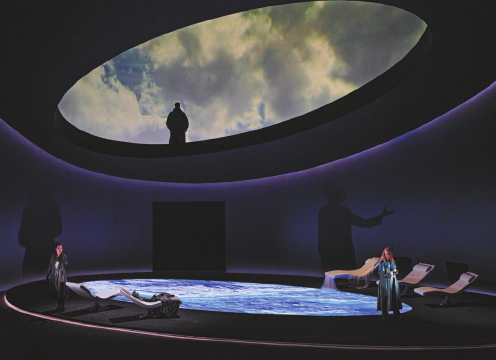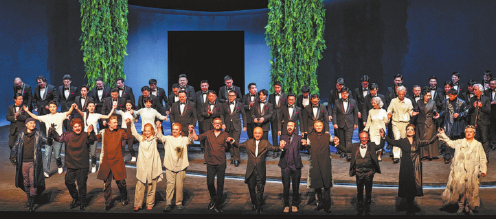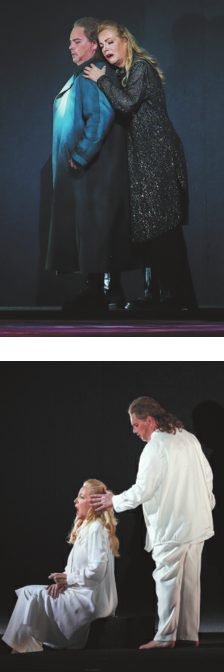Wagner's double crescendo
For the first time, a production from Germany's legendary Bayreuth Festival was staged outside Europe, Zhang Kun reports in Shanghai.

As the house lights dimmed at the Shanghai Grand Theatre on July 4, the haunting prelude of German composer Richard Wagner's Tristan und Isolde began to unfold, marking not just the start of a nearly five-hour operatic journey, but a historic cultural moment.
For the first time, a production from Germany's legendary Bayreuth Festival was staged outside Europe, launching the ambitious Bayreuth in Shanghai project that will run through 2027. This new rendition of Tristan und Isolde, based on the acclaimed 2022 Bayreuth Festival edition, is more than a theatrical feat. Jointly produced by the Shanghai Opera House and the SGT, it signals the deepening of artistic collaboration between China and Germany and Shanghai's rising stature as a global center for world-class opera.
Conducted by Xu Zhong, president of SOH, the production featured singers and musicians from SOH and an international cast led by Erin Caves and Corby Welch playing Tristan, Lise Lindstrom and Nina Warren as Isolde.
The Bayreuth Festival, founded by Wagner (1813-83) in 1876, is one of Europe's most prestigious summer arts festivals. It is dedicated to the performance of Wagner's last 10 works, such as The Flying Dutchman, Lohengrin and The Ring of the Nibelung.
Held annually from late July to August at the Bayreuth Festspielhaus in Germany, the Bayreuth Festival has been staged 112 times to date. The festival's musicians are directly invited by the organizers from professional orchestras across Germany and Europe, including top European orchestras such as the Berlin Philharmonic, Munich Philharmonic, and the Frankfurt Opera.
In December, the Bayreuth Festival announced the Bayreuth in Shanghai project. According to the project, three Bayreuth Festival productions will be staged in Shanghai from 2025 to 2027 — the first being Tristan und Isolde, followed by Tannhauser and Die Walkure, the second opera in Wagner's cycle The Ring of the Nibelung. The project will also feature opera events for children and educational programs involving international collaboration among instrumentalists in Shanghai.
The performance also marked the Asian debut of the production.
"To faithfully re-create the opera production of Bayreuth Festival is of vital importance to the success of Bayreuth in Shanghai," according to Zhang Xiaoding, general manager of SGT. This performance not only fills a longstanding gap in the local opera repertoire, but also brings the most authoritative and authentic Wagner tradition to deeply integrate into Shanghai's classical art scene. Through a continuous three-year project, a precise connection between both sides, artistic and technical, is being established for the first time, she says.
The successful performance of the opera "is not only a grand event for Sino-German cultural exchange, but it will also be an important milestone for Shanghai to become a new hub of world-class opera productions," says Xu, director of SOH.
This is the first time ever Bayreuth Festival shared their production in a foreign country, and the collaboration of singers from Shanghai Opera House and the international artists makes the production very special, says American tenor Caves. He praises the Chinese singers for their "great voices", and adds that "they would have wonderful careers if they came to Europe as well. They are fantastic, great singers".
Tristan und Isolde is a very demanding opera for not just the singers, "but for every person in the orchestra", says American soprano Lindstrom, who plays the leading female character Isolde. "They have to be completely focused for five hours. It is immense, but it is the best music that was ever written."
The production in Shanghai is of "extremely high quality", she says. "Shanghai can feel so proud of how they have created this, because it is with respect, honor and enthusiasm and hunger for this experience."
Chinese tenor Yu Haolei, who plays the role of Melot, says that Tristan und Isolde is "the most difficult opera I've ever encountered in my career". Working with top vocal artists from around the world, "I've learned a lot — from diction to singing techniques. This has greatly helped my professional growth".
Alessandro Amoretti, vocal coach for the production, has worked with Shanghai Opera House for almost 10 years, walking Chinese singers through operas in French, Italian and German. "I've seen their tremendous artistic and professional development, and I've seen the development of the Shanghai Opera House," he says.
"It's really amazing to see how young the audiences are here. The audience that comes to opera in the west is aging. We are struggling to create a new generation of young people that are interested in opera.
"But here, you see young people, girls and boys, genuinely excited to listen to classical music. It's very encouraging."
To promote the opera's premiere, the Shanghai Grand Theatre designed a series of public educational programs. Among the most creative were yoga sessions held in the theater's lobby, accompanied by Wagner's music. "It was a really nice idea," says Dirk Girschik, executive director of the opera. "I'd never thought of connecting yoga to Wagner," he admits, "but then Tristan und Isolde has deep philosophical themes — from Western mysticism to Sanskrit and Buddhist metaphysics — so it really fits."




Today's Top News
- China completes over 8 million hectares of land greening in 2025
- FTZ helps Kashgar invigorate regional commerce
- Canada, China should eye a fresh start
- US playing with fire on thin Arctic ice
- Party conduct key to clean governance
- US to pause immigrant visa processing from 75 countries






























